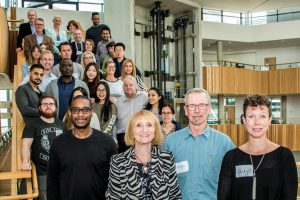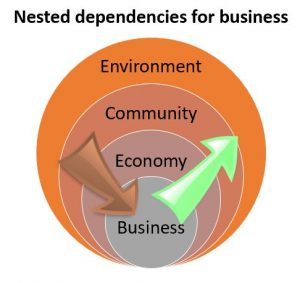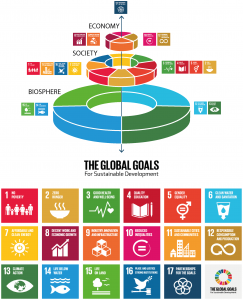The Faculty of Management held a “Sustainability Symposium” yesterday as one response to the challenges facing businesses today. Organised by Dr Karen Thompson in collaboration with Professor Janet Dickinson and Gwyn Jones, a Director of the Association of Sustainability Practitioners, the event brought together over 50 participants, including academics from a range of disciplines, students and external practitioners.

Sustainability is not just about technology, as Professor Janet Dickinson explains:
“The Committee on Climate Change suggest the UK could achieve net zero greenhouse gas emissions by 2050. Technology is expected to produce 38% of the reduction, societal/behavioural change delivering 9% and the remining 53% coming from a combination of both.”
Clearly, social scientists and business experts will need to work with the technologists to develop solutions and change society if we are to achieve this target.
Nor is sustainability just an issue for future generations. The impacts of greenhouse gas emissions are here today and, according to the latest models, we only have a very short window of opportunity before the planet reaches a ‘tipping point’ beyond which we will be unable to reverse progress towards an uninhabitable planet. “Being less unsustainable is not the same as being sustainable” (Hugo Spowers, Founder & CEO of Riversimple).
Sustainability is high on the list of priorities for BU. Our BU2025 vision includes KPIs for all our research and education to be aligned with one or more of the UN’s 17 Sustainable Development Goals, and a new Strategic Investment Area has recently been launched in ‘Sustainability, Low-Carbon Technology and Materials Science’.

Business is one of the greatest forces on the planet. Emerging research suggests that companies who proclaim their ‘green’ credentials most loudly often perform the worst, not just in terms of the environment but also in terms of profits and shareholder value over the long term. Trading-off between the short term and the long term, or between domains, does not produce sustainability for a business.
One of the questions posed by Gwyn Jones was ‘What are we trying to sustain? He suggested that what we are aiming to sustain is life. And the question we do not yet have an answer to is ‘How can 10 billion people live in harmony and peace, equitably by 2050?’
Seeking answers to this question in a business context involves developing our understandings of the dependencies among profit, people and planet. In other words, every business depends upon a community, and all communities depend on the natural environment.

All businesses draw resources from and have impacts, both beneficial and detrimental, on the other domains. Awareness and understanding of these dependencies will be required if we are to make progress. The UN’s 17 Sustainable Development Goals can provide a useful framework for analysing impact and are mapped against the biosphere, society and the economy.
Sustainability has profound implications for both education and research.
We explored the question ‘Can sustainability be taught?’ (see a separate post on this).
Research on sustainability is likely to require one or more of the three characteristics identified during the event:
- Cross-disciplinary thinking that seeks to understand the complexity of social practices
- Fundamental re-thinking of existing models and ways of doing business
- Partnerships with practitioners and stakeholders representing the interests of all domains.
Further thoughts on the implications for research are discussed in a separate post (see ‘Sustainability changes everything’).
For further information please contact Dr Karen Thompson or Professor Janet Dickinson, from Faculty of Management.











 Beyond Academia: Exploring Career Options for Early Career Researchers – Online Workshop
Beyond Academia: Exploring Career Options for Early Career Researchers – Online Workshop UKCGE Recognised Research Supervision Programme: Deadline Approaching
UKCGE Recognised Research Supervision Programme: Deadline Approaching SPROUT: From Sustainable Research to Sustainable Research Lives
SPROUT: From Sustainable Research to Sustainable Research Lives BRIAN upgrade and new look
BRIAN upgrade and new look Seeing the fruits of your labour in Bangladesh
Seeing the fruits of your labour in Bangladesh ECR Funding Open Call: Research Culture & Community Grant – Apply now
ECR Funding Open Call: Research Culture & Community Grant – Apply now ECR Funding Open Call: Research Culture & Community Grant – Application Deadline Friday 12 December
ECR Funding Open Call: Research Culture & Community Grant – Application Deadline Friday 12 December MSCA Postdoctoral Fellowships 2025 Call
MSCA Postdoctoral Fellowships 2025 Call ERC Advanced Grant 2025 Webinar
ERC Advanced Grant 2025 Webinar Update on UKRO services
Update on UKRO services European research project exploring use of ‘virtual twins’ to better manage metabolic associated fatty liver disease
European research project exploring use of ‘virtual twins’ to better manage metabolic associated fatty liver disease